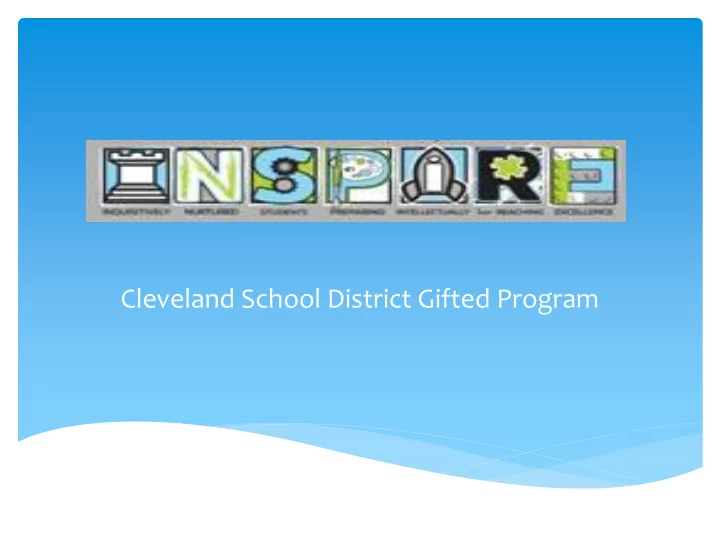

Cleveland School District Gifted Program
The Cleveland Gifted Education Program strives to produce students who possess the skills needed,, both cognitive and affective, to successfully meet new situations through exploration.
Our Teachers Paulette Howze Bell Academy Elementary Pam Maxwell Cypress Parks/Nailor Elem. Allyson Hardy Hayes Cooper Center Amy Chudy Hayes Cooper Center Janella Sampolesi Hayes Cooper Center Amy Plummer Parks Elementary Tonya Longest Pearman Elementary
Intellectually Based Program INSPIRE classes meet one time per week per grade level (Pull Out) Five hours per day Unit Based Curriculum
Career Explorations Affective Skills Self-Directed Learning Research Communication Group Dynamics Creativity Thinking Skills
Bloom’s Taxonomy
What is “Gifted” Highly gifted children tend to be those who demonstrate various rates of development. Due to their high cognitive abilities and high intensities they experience and relate to the world in unique ways. These children are often found as a result of extremely high on an individually scored IQ test, generally above the 12o IQ Score Others may be prodigies in areas such as math, science language and/or the arts. There is NO FEDERAL DEFINITION Varies by state
Commom Characteristics of the Gifted Child Thinking is Abstract, Complex, Logical and Insightful Rapid Learner Excellent Memory Unusually Large Vocabulary Advanced and Complex Thinking Deep, intense feelings and reactions Highly Sensitive Vivid Imaginations Self-Taught Preoccupied with own thoughts-daydreamer Resource: National Association for Gifted Children
MYTHS about Gifted Children Gifted Students Don’t Need Help; They’ll do fine on their own. Truth: Gifted students need guidance from well-trained teachers who challenge and support them in order to fully develop their abilities.
MYTHS Cont … All Children are Gifted Truth: All children have strengths and positive attributes, but not all children are gifted in the educational sense of the word. Gifted children have an advanced capacity in various areas, which requires modifications to the regular curriculum to ensure these children are challenged and learn new material.
MYTHS Cont … That Student can’t be gifted, he/she is receiving poor grades. TRUTH: Underachievement describes a discrepancy between a student’s performance and his actual ability. The roots of this problem differ, based on each child’s experiences. Gifted students may become bored or frustrated in an unchallenging classroom situation causing them to lose interest, learn bad study habits, or distrust the school environment. Other students may mask their abilities to try to fit in socially with their same-age peers.
MYTHS Cont … Gifted Students are Happy, Popular, and Well Adjusted in School. TRUTH: Underachievement describes a discrepancy between a student’s performance and his actual ability. The roots of this problem differ, based on each child’s experiences. Gifted students may become bored or frustrated in an unchallenging classroom situation causing them to lose interest, learn bad study habits, or distrust the school environment. Other students may mask their abilities to try to fit in socially with their same-age peers.
MYTHS Cont … Gifted Students are Happy, Popular, and Well Adjusted in School. TRUTH: Underachievement describes a discrepancy between a student’s performance and his actual ability. The roots of this problem differ, based on each child’s experiences. Gifted students may become bored or frustrated in an unchallenging classroom situation causing them to lose interest, learn bad study habits, or distrust the school environment. Other students may mask their abilities to try to fit in socially with their same-age peers.
Myths Cont: This Child Can’t be Gifted, He Has a Disability Truth: Some gifted students also have learning or other disabilities. These “twice exceptional” students often go undetected in regular classroom because their disability and gifts mask each other, making them appear “average.”
Gifted or High Achievers Intellectually Gifted Academically Gifted Ask Questions Knows the Answers Highly Curious Interested Mentally and Physically Attentive Involved Has Good Ideas Wild Silly Ideas Works Hard Plays Around yet Tests Well Answers the Questions Discusses in Detail Top Group Beyond Top Group Listens with Interest Strong Feelings/Opinions Learns with Ease Already Knows Understands Ideas Constructs Abstractions
The Family Educational Rights and Privacy Act (FERPA) is a Federal Law that protects the privacy of student education records. The law applies to all schools that receive funds under an applicable program of the U.S. Department of Education (ww2.ed.gov).
Program Affiliation and Resources MAGC- Mississippi Association of Gifted Children www.mde.k12.ms.us www.hoagiesgifted.org www.nagc.org www.prufrock.com www.code.org.
Recommend
More recommend